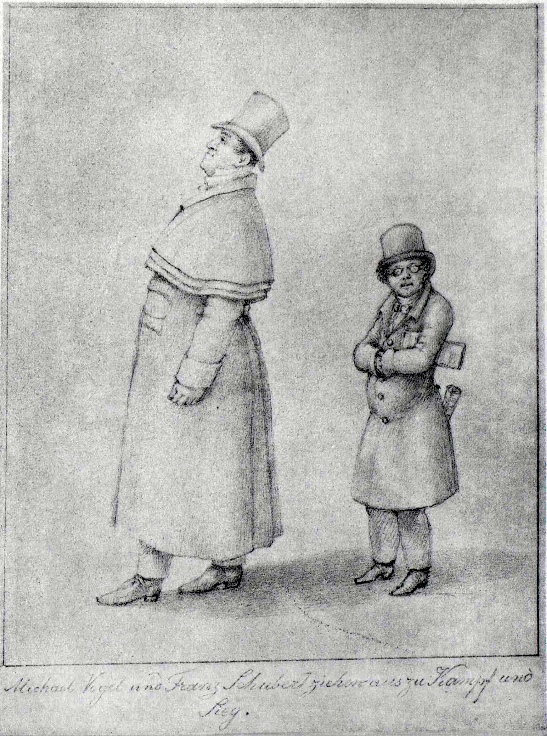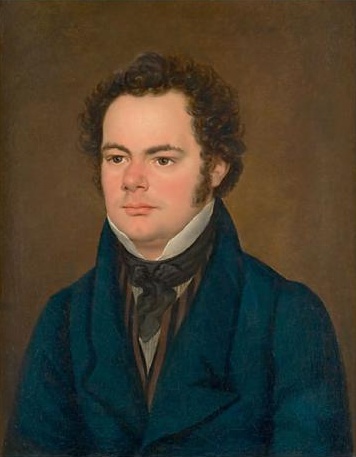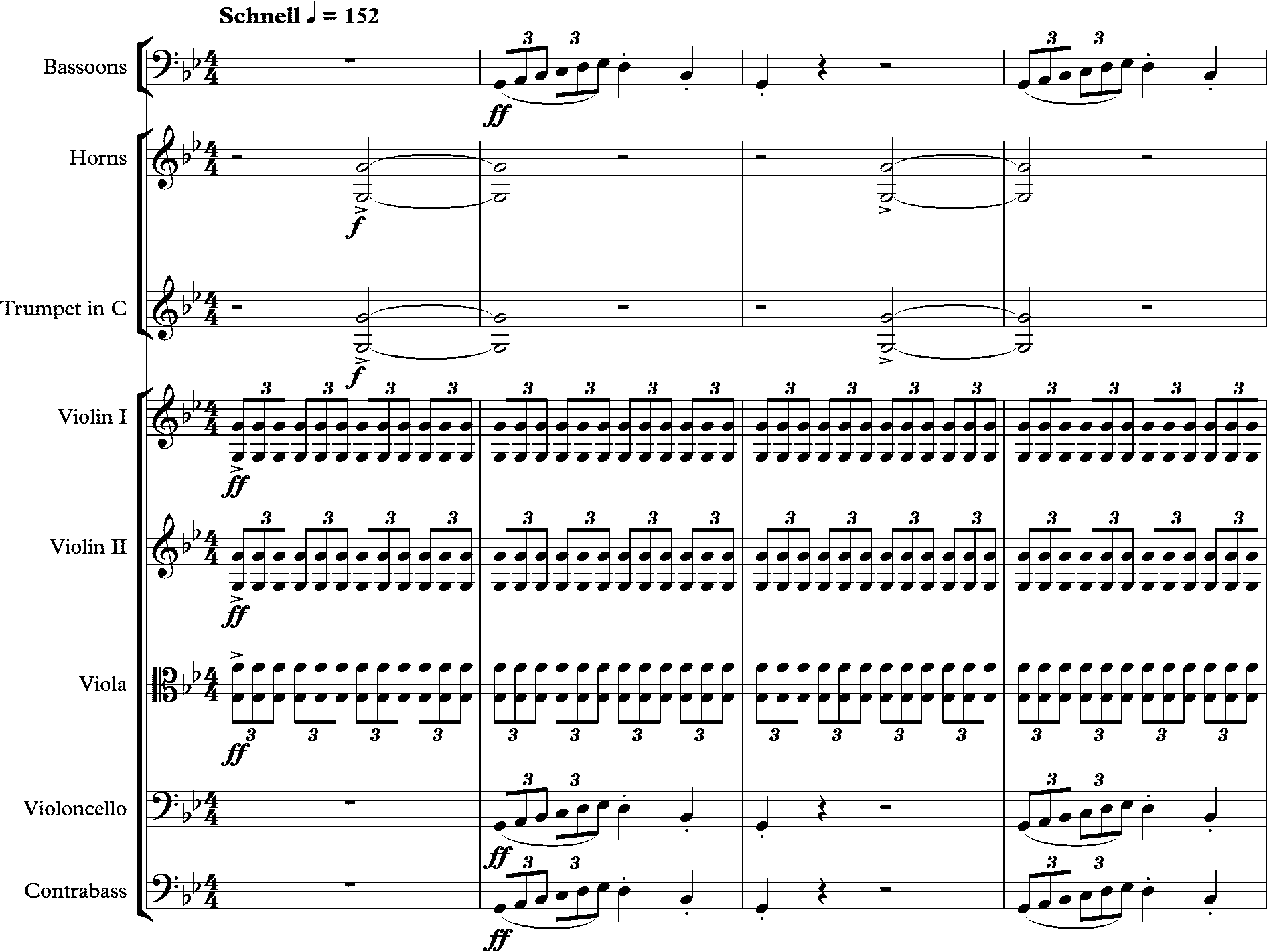|
Franz Schubert
Franz Peter Schubert (; ; 31 January 179719 November 1828) was an Austrian composer of the late Classical period (music), Classical and early Romantic music, Romantic eras. Despite his short life, Schubert left behind a List of compositions by Franz Schubert, vast ''oeuvre'', including more than 600 ''Lieder'' (art songs in German) and other vocal works, seven complete symphonies, sacred music, operas, incidental music, and a large body of piano and chamber music. His major works include "Erlkönig (Schubert), Erlkönig", "Gretchen am Spinnrade", and "Ave Maria (Schubert), Ave Maria"; the Trout Quintet, ''Trout'' Quintet; the Symphony No. 8 (Schubert), Symphony No. 8 in B minor (''Unfinished''); the Symphony No. 9 (Schubert), Symphony No. 9 in C major (''Great''); the String Quartet No. 14 (Schubert), String Quartet No. 14 in D minor (''Death and the Maiden''); the String Quintet (Schubert), String Quintet in C major; the Impromptus (Schubert), Impromptus for solo piano; the S ... [...More Info...] [...Related Items...] OR: [Wikipedia] [Google] [Baidu] [Amazon] |
Impromptus (Schubert)
Franz Schubert's Impromptus are a series of eight pieces for solo piano composed in 1827. They were published in two sets of four impromptus each: the first two pieces in the first set were published in the composer's lifetime as Op. 90; the second set was published posthumously as Op. 142 in 1839 (with a dedication added by the publisher to Franz Liszt). The third and fourth pieces in the first set were published in 1857 (although the third piece was printed by the publisher in G major, instead of G as Schubert had written it, and remained available only in this key for many years). The two sets are now catalogued as D. 899 and D. 935 respectively. They are considered to be among the most important examples of this popular early 19th-century genre. Three other unnamed piano compositions (D. 946), written in May 1828, six months before the composer's death, are known as both "Impromptus" and ''Klavierstücke'' ("piano pieces"). The Impromptus are often considered companion pieces ... [...More Info...] [...Related Items...] OR: [Wikipedia] [Google] [Baidu] [Amazon] |
Erlkönig (Schubert)
"Erlkönig", Opus number, Op. 1, 328, is a ''Lied'' composed by Franz Schubert in 1815 in music, 1815, which sets Johann Wolfgang von Goethe's poem Erlkönig, of the same name. The singer takes the role of four characters — the narrator, a father, his small son, and the titular "Erlking", a supernatural creature who pursues the boy — each of whom exhibit different tessitura, harmony, harmonic and rhythmic characteristics. A technically challenging piece for both performers and accompanists, "Erlkönig" has been popular and acclaimed since its premiere in 1821, and has been described as one of the "commanding compositions of the century". Among Schubert's most famous works, the piece has been arranged by various composers, such as Franz Liszt (solo piano) and Heinrich Wilhelm Ernst (solo violin); Hector Berlioz, Franz Liszt, and Max Reger have orchestrated the piece. History Goethe's poem was set in music by at least a hundred composers, including Johann Friedrich Reich ... [...More Info...] [...Related Items...] OR: [Wikipedia] [Google] [Baidu] [Amazon] |
Fantasia In F Minor (Schubert)
The Fantasia in F minor by Franz Schubert, D.940 ( Op. posth. 103), for piano four hands (two players at one piano), is one of Schubert's most important works for more than one pianist and one of his most important piano works altogether. He composed it in 1828, the last year of his life. A dedication to his former pupil Caroline Esterházy can only be found in the posthumous first edition, not in Schubert's autograph. Musicologist Christopher Gibbs has described the work as "among not only his greatest but his most original" compositions for piano duet. Gibbs, p. 161 History Franz Schubert began writing the Fantasia in January 1828 in Vienna. The work was completed in March of that year, and first performed in May. Schubert's friend Eduard von Bauernfeld recorded in his diary on May 9 that a memorable duet was played, by Schubert and Franz Lachner. Weekly, p. 72 The work was dedicated to Caroline Esterházy, with whom Schubert was in (unrequited) love. Gibbs, pp. 150-1 ... [...More Info...] [...Related Items...] OR: [Wikipedia] [Google] [Baidu] [Amazon] |
Trout Quintet
The ''Trout Quintet'' (''Forellenquintett'') is the popular name for the Piano Quintet in A major, D. 667, by Franz Schubert. The piano quintet was composed in 1819, when he was 22 years old; it was not published, however, until 1829, a year after his death. Rather than the usual piano quintet ensemble of piano and string quartet, the ''Trout Quintet'' is written for piano, violin, viola, cello and double bass. According to Schubert's friend Albert Stadler, it was modelled on an arrangement of Johann Nepomuk Hummel's then-popular Septet in D Minor for Flute, Oboe, Horn, Viola, Cello, Bass and Piano, Op. 74. That arrangement, using the same, somewhat unusual instrumentation chosen by Schubert, had been published in Vienna in about 1817, only a few years before the composition of the ''Trout Quintet''. It may also have been influenced by Hummel's Quintet in E flat minor, Op. 87 . Nickname The piece is known as the ''Trout'' because the fourth movement is a set of variation ... [...More Info...] [...Related Items...] OR: [Wikipedia] [Google] [Baidu] [Amazon] |
Vienna
Vienna ( ; ; ) is the capital city, capital, List of largest cities in Austria, most populous city, and one of Federal states of Austria, nine federal states of Austria. It is Austria's primate city, with just over two million inhabitants. Its larger metropolitan area has a population of nearly 2.9 million, representing nearly one-third of the country's population. Vienna is the Culture of Austria, cultural, Economy of Austria, economic, and Politics of Austria, political center of the country, the List of cities in the European Union by population within city limits, fifth-largest city by population in the European Union, and the most-populous of the List of cities and towns on the river Danube, cities on the river Danube. The city lies on the eastern edge of the Vienna Woods (''Wienerwald''), the northeasternmost foothills of the Alps, that separate Vienna from the more western parts of Austria, at the transition to the Pannonian Basin. It sits on the Danube, and is ... [...More Info...] [...Related Items...] OR: [Wikipedia] [Google] [Baidu] [Amazon] |
Wolfgang Amadeus Mozart
Wolfgang Amadeus Mozart (27 January 1756 – 5 December 1791) was a prolific and influential composer of the Classical period (music), Classical period. Despite his short life, his rapid pace of composition and proficiency from an early age resulted in List of compositions by Wolfgang Amadeus Mozart, more than 800 works representing virtually every Western classical genre of his time. Many of these compositions are acknowledged as pinnacles of the symphony, symphonic, concerto, concertante, chamber music, chamber, operatic, and choir, choral repertoires. Mozart is widely regarded as one of the greatest composers in the history of Classical music, Western music, with his music admired for its "melodic beauty, its formal elegance and its richness of harmony and texture". Born in Salzburg, Mozart showed Child prodigy, prodigious ability from his earliest childhood. At age five, he was already competent on keyboard and violin, had begun to compose, and performed before European r ... [...More Info...] [...Related Items...] OR: [Wikipedia] [Google] [Baidu] [Amazon] |
Joseph Haydn
Franz Joseph Haydn ( ; ; 31 March 173231 May 1809) was an Austrian composer of the Classical period (music), Classical period. He was instrumental in the development of chamber music such as the string quartet and piano trio. His contributions to musical form have led him to be called "Father of the Symphony" and "Father of the String quartet". Haydn arose from humble origins, the child of working people in a rural village. He established his career first by serving as a chorister at St. Stephen's Cathedral, Vienna, then through an arduous period as a freelance musician. Eventually he found career success, spending much of his working life as Kapellmeister, music director for the wealthy Esterházy family at their palace of Eszterháza in rural Hungary. Though he had his own orchestra there, it isolated him from other composers and trends in music so that he was, as he put it, "forced to become original". During this period his music circulated widely in publication, eventuall ... [...More Info...] [...Related Items...] OR: [Wikipedia] [Google] [Baidu] [Amazon] |
Alsergrund
Alsergrund (; ) is the ninth district of Vienna, Austria (). It is located just north of the first, central district, Innere Stadt. Alsergrund was incorporated in 1862, with seven suburbs. As a central district, the area is densely populated. According to the census of 2001, there were 37,816 inhabitants over 2.99 square km (1.15 sq. mi). Many departments of the University of Vienna (main university), TU Wien and the University of Natural Resources and Life Sciences (BOKU) are located in Alsergrund. Until 2013 the University of Economics and Business ( Wirtschaftsuniversität Wien) was also located in the 9th district, but eventually moved to the 2nd district. There are also many large hospitals, including the biggest in Vienna, the AKH (, "General Hospital"). Alsergrund is associated with many notable names of Viennese art and science. It is the birthplace of Romantic composer Franz Schubert. Classic music composer Ludwig van Beethoven died here in his apartment at Schwarzspan ... [...More Info...] [...Related Items...] OR: [Wikipedia] [Google] [Baidu] [Amazon] |
Schwanengesang
''Schwanengesang'' (Swan Song), 957, is a collection of 14 songs written by Franz Schubert at the end of his life and published posthumously: # Liebesbotschaft (text: Ludwig Rellstab) # Kriegers Ahnung (Rellstab) # Frühlingssehnsucht (Rellstab) # Ständchen (Rellstab) # Aufenthalt (Rellstab) # In der Ferne (Rellstab) # Abschied (Rellstab) # Der Atlas (Heinrich Heine) # Ihr Bild (Heine) # Das Fischermädchen (Heine) # Die Stadt (Heine) # Am Meer (Heine) # Der Doppelgänger (Heine) # Die Taubenpost (alternative: D 965a) (Johann Gabriel Seidl) The autograph manuscript of the collection is preserved in the Morgan Library & Museum. Background Named by its first publisher, Tobias Haslinger, who presumably wished to present it as Schubert's last testament, ''Schwanengesang'' differs from the earlier ''Die schöne Müllerin'' and ''Winterreise'' song-cycles by including settings of more than one poet. Seven texts by Ludwig Rellstab (1799–1860) are followed by six by Heinrich Heine ... [...More Info...] [...Related Items...] OR: [Wikipedia] [Google] [Baidu] [Amazon] |
Winterreise
''Winterreise'' (, ''Winter Journey'') is a song cycle for voice and piano by Franz Schubert (Schubert Thematic Catalogue, D. 911, published as Opus number, Op. 89 in 1828), a setting of 24 Poetry, poems by German poet Wilhelm Müller. It is the second of Schubert's two song cycles on Müller's poems, the earlier being ''Die schöne Müllerin'' (D. 795, Op. 25, 1823). Both were originally written for tenor voice but are frequently Transposition (music), transposed to other vocal ranges, a precedent set by Schubert himself. The two works pose interpretative demands on listeners and performers due to their scale and structural coherence. Although Ludwig van Beethoven's cycle ''An die ferne Geliebte'' (''To the Distant Beloved'') was published earlier, in 1816, Schubert's cycles hold the foremost place in the genre's history. The cycle consists of a monodrama from the point of view of the wandering protagonist, in which concrete plot is somewhat ambiguous. After his beloved falls f ... [...More Info...] [...Related Items...] OR: [Wikipedia] [Google] [Baidu] [Amazon] |
Die Schöne Müllerin
' (,"The Fair Maid of the Mill", Op. 25, D. 795), is a song cycle by Franz Schubert from 1823 based on 20 poems by Wilhelm Müller. It is the first of Schubert's two seminal cycles (preceding ''Winterreise'')'','' and a pinnacle of ''Lied'' repertoire. ''Die schöne Müllerin'' is performed by a pianist and a solo singer. The vocal part falls in the range of a tenor or soprano voice, but is often sung by other voices, transposed to a lower range, a precedent established by Schubert himself. Since the protagonist is a young man, performances by women's voices are less common. The piano part bears much of the expressive burden of the work, and is only seldom a mere 'accompaniment' to the singer. A typical performance lasts around sixty to seventy minutes. Composition Müller published twenty-five poems in the first fascicule (1821) of ''Sieben und siebzig Gedichten aus den nachgelassenen Papieren eines reisenden Waldhornisten'' (Seventy-seven Poems from the Posthumous Papers of ... [...More Info...] [...Related Items...] OR: [Wikipedia] [Google] [Baidu] [Amazon] |
Song Cycles
A song cycle () is a group, or cycle, of individually complete songs designed to be performed in sequence, as a unit.Susan Youens, ''Grove online'' The songs are either for solo voice or an ensemble, or rarely a combination of solo songs mingled with choral pieces. The number of songs in a song cycle may be as brief as two songs or as long as 30 or more songs. The term "song cycle" did not enter lexicography until 1865, in Arrey von Dommer's edition of ''Koch’s Musikalisches Lexikon'', but works definable in retrospect as song cycles existed long before then. One of the earliest examples may be the set of seven Cantigas de amigo by the 13th-century Galician jongleur Martin Codax. Jeffrey Mark identified the group of dialect songs 'Hodge und Malkyn' from Thomas Ravenscroft's ''The Briefe Discourse'' (1614) as the first of a number of early 17th-century examples in England. A song cycle is similar to a song collection, and the two can be difficult to distinguish. Some typ ... [...More Info...] [...Related Items...] OR: [Wikipedia] [Google] [Baidu] [Amazon] |








